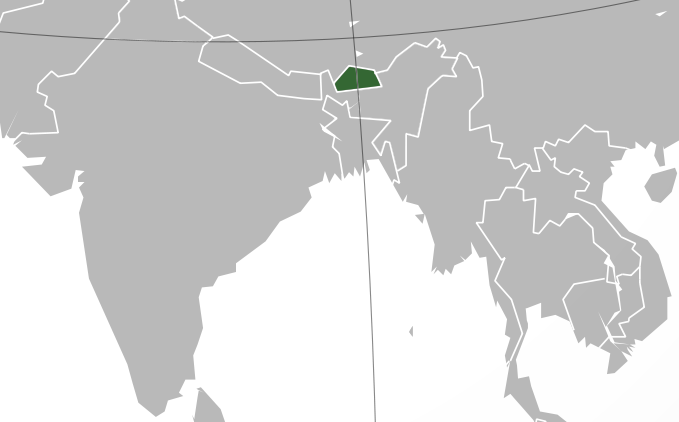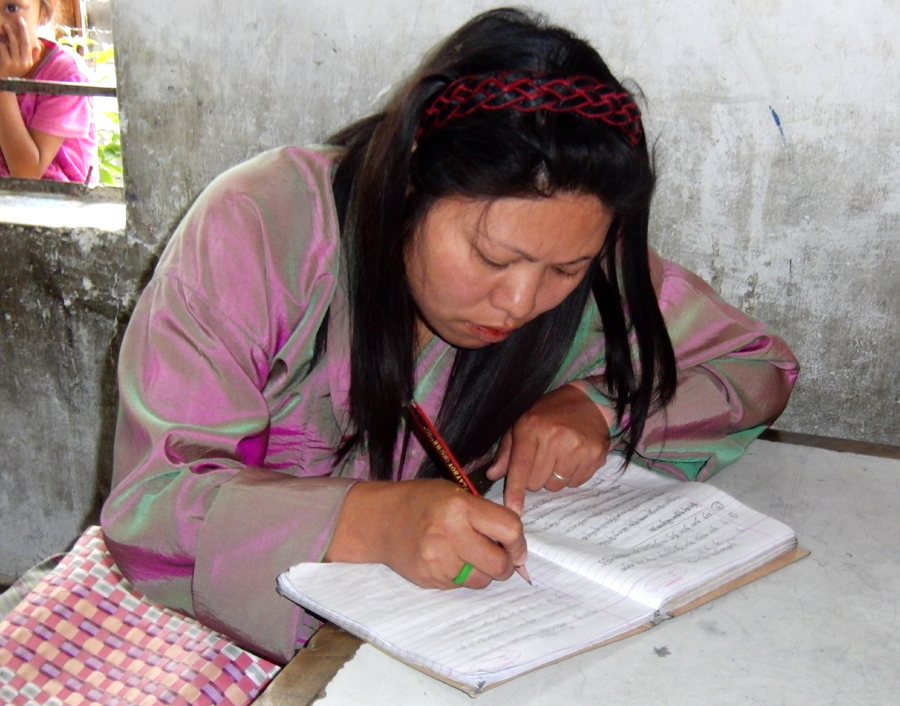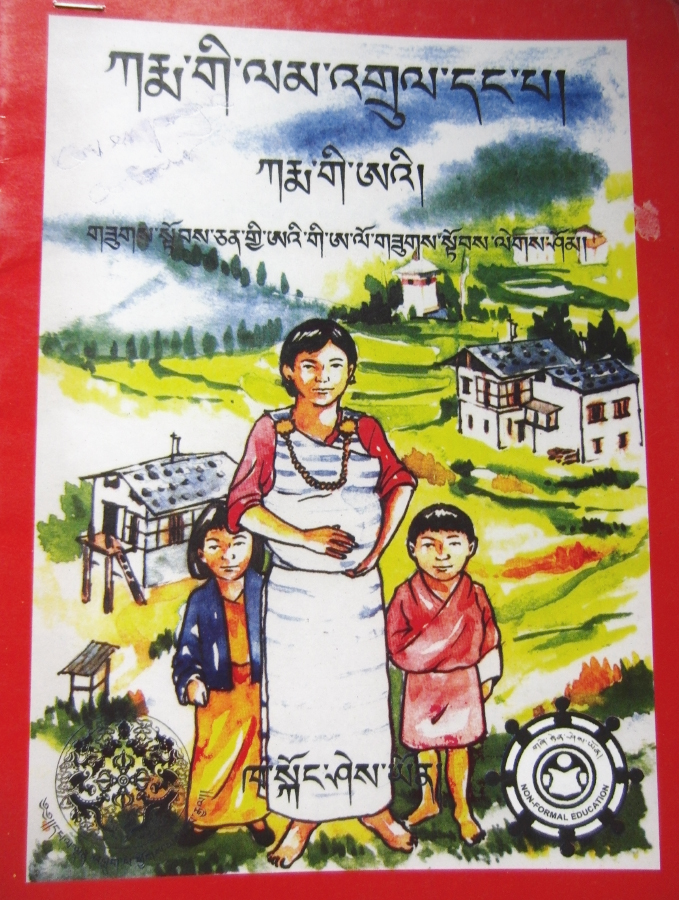Non-Formal and Continuing Education Programme
Country Profile: Bhutan
| Population | 754,000 (2013) |
|---|---|
| Poverty (Population living on less than US$ 1.25 per day) | 23.2% |
| Official Language | Dzongkha |
| Other spoken languages | Chocangacakha, Khengkha languages, Brokpa languages et al. |
| Total Expenditure on Education as % of GNP | 9.4% (2010) |
| Access to Primary Education – Total Net Intake Rate (NIR) | 88% |
| Adult Literacy Rate (15 years and over, 2005–2008) | Female: 68% |
| Statistical Sources |
|
Programme Overview
| Programme Title | Non-Formal and Continuing Education Programme |
|---|---|
| Implementing Organization | Non-Formal and Continuing Education Division (NFCED), the District Education Office |
| Language of Instruction | Dzongkha, English (only in the case of post literacy programmes) |
| Programme Partners | UNICEF, UNESCO |
| Date of Inception | 1991 |
Background and context

The Government of Bhutan is committed to providing lifelong learning opportunities to adult learners. In 1991, the Non-Formal Education (NFE) Programme was created by the joint efforts of the Dzongkha Development Authority (DDA) and the national Women’s Association of Bhutan (NWAB). In 1996, the NFE Programme was taken over by the Ministry of Education and it began growing rapidly. Currently, 953 NFE centres exist and more than 13 500 learners participate in the NFE Programme annually. Despite this progress, Bhutan still faces a low literacy rate. The NFE Programme, therefore, occupies quite an important role in meeting Bhutan’s objective of lifelong learning.
Non-Formal and Continuing Education Division (NFCED)
The Non-Formal and Continuing Education Division (NFCED) is a division within the Department of Adult and Higher Education in the Ministry of Education.
The objectives of NFCED are:
- to provide quality literacy and numeracy education in Dzongkha, the official language, to those who did not receive/complete a formal education, in order to:
- promote Dzongkha
- increase the literacy rate (aiming to achieve 70% adult literacy by 2013 and ultimately near 100% by 2015)
- to provide life skills and livelihood skills education
- to provide lifelong learning opportunities.
Programme implementation: Approaches and methods
Programme implementation
NFCED coordinates and facilitates the policy formulation, curriculum development and capacity development for non-formal and continuing education programmes. District education officers in 20 districts in the country are then responsible for managing the NFE centres in their districts. At community level, school principals who are mandated by the Ministry of Education, are designated to supervise and provide support for the NFE centres and facilitators. Village elders under the chairmanship of the village chiefs are also actively involved in the management of the NFE in their communities.
Programmes offered

The basic literacy programme takes place over one and a half years, and is held for three hours per day for five days a week at the NFE centres, usually housed in local schools. It is offered in the official language. In addition to basic literacy and numeracy skills, learners receive a livelihood skills education. Therefore, on the completion of the programme, learners are not only expected to have basic skills in reading, writing and calculations but also knowledge and skills related to health, sanitation, environment, agriculture, livestock, early childcare and development, STD/AIDS prevention and other relevant life skills. The average number of learners is 20 per class.
The post literacy programme is a year-long programme. Learners meet for three hours per day, five days a week at NFE centres. This programme is designed for learners who have completed the basic literacy programme or for those with existing basic literacy skills. The post literacy curriculum consists broadly of three levels. Each level is further divided into seven thematic areas: health, environment and agriculture, income generating/livelihood, social/cultural issues, early childhood development, good governance, and disaster management. The learners also have the option to learn English at this level. The average number of learners is 20 per class.

- The self-learning programme does not follow a set structure. The individual learner goes to NFE centres to read and learn using materials of their choice which are available at the centres. This programme was created to support continuous and lifelong learning. The community learning centre (CLC) manager is there if needed to support the learner. The CLC is usually a small, community building constructed through community participation. Sometimes rooms in local schools, private houses, temples, or out-reach clinics are used as CLCs. A CLC provides a number of activities for literacy education and life skills development and accommodates other community development programmes and meetings. Two major activities that take place at CLCs are reading (reading corners are provided where learners can find books of interest) and skills training (such as tailoring, furniture making, souvenir making, and embroidery and weaving). In some of the CLCs both basic literacy and post literacy courses are also offered.

- The continuing education (CE) programme lasts for 10 months. It is held for two hours a day on Monday to Fridays and four hours on Saturday. It is designed to create an avenue for continuous and lifelong learning for people who could not complete their formal studies. Currently the government and private higher secondary schools offer CE to adult learners who are mostly government employees or from private organisations. The learners follow the same curriculum of the formal system. The average number of learners is 40 per class. CE candidates completing class XII are given the Bhutan Higher Secondary Education Certificate examination (BHSEC) and those candidates completing class X are given the Bhutan Certificate of Secondary Education examination (BCSE).
Programme content and material development

In order to provide relevant content in NFE programmes, learners’ needs are identified through surveys, seminars, workshops and interaction. Small surveys on literacy are conducted by district education officers and other relevant sector heads, and seminars and workshops are conducted for stakeholders such as local leaders, sector heads at the districts, parent principals and NFE instructors. In addition, economic, social and cultural needs, as well as other emerging issues in communities and the nation at large are also considered. The current content is broadly based on seven thematic areas: health, environment and agriculture, income generating/livelihood, social/cultural issues, early childhood development, good governance and disaster management.

The materials are developed through material development workshops which are attended by all stakeholders at the national level, such as NFE instructors, parent principals, programme coordinators from other relevant agencies, education officers from the districts and programme coordinators from the NFCED. The draft materials are then pre-tested for necessary adjustments. Often, international consultants are also involved to ensure the quality of the materials.
The content of the teaching and learning materials is updated regularly to suit emerging needs.
Training
Facilitators are grade X or grade XII graduates. They are hired full-time and paid. Training for new facilitators is conducted annually and refresher training for current facilitators is arranged at regular intervals. Because most of the learners are adults, courses on adult learning principles and teaching techniques are given during the initial and refresher training. When new curriculum materials are developed, workshops are organised for the facilitators so that they can familiarise themselves with the changes in the materials. In addition, a series of cluster- (several NFE centres from different districts) and national-based in-service workshops are organised to build on this and to update instructors on the recent changes and developments. The training and workshops described above are provided by experienced facilitators. They are the most competent and committed facilitators who have been identified and trained to become trainers of facilitators. Regular refresher courses for these trainers are also conducted. District education officers are trained on the policies and programmes of the NFE at national level. The district education officers, in turn, train school principals who are in charge of managing and providing support to the NFE centres and facilitators.
Monitoring and evaluation
The monitoring of the NFE centres is entrusted to different stakeholders at different levels:
- at a community level by the local NFE committee which is comprised of school principals and village elders under the chairmanship of the village chiefs
- at district level by the respective district education officers
- at national level by the NFCED.
The Division mainly depends on the quarterly progress reports submitted by the NFE centres through the district education officers as well as field visits made by the programme officers. As for outcome evaluation, because most of the NFE’s programme activities are supported by international agencies, it is measured, recorded and submitted to funding agencies. The outcome evaluation is conducted by the Planning and Monitoring System (PlaMS), and the line Ministry submits reports to the Government – Gross National Commission.
An impact assessment on NFE programmes was carried out in 2008, and the findings were shared among the stakeholders. The stakeholders at community, district and national levels, are currently taking action on the recommendations arising from the assessment. The impact assessment report is available.
Impact
- Currently there are 958 NFE centres and 22 CLCs in the country.
- The number of NFE centres increased from five in 1992 to 953 in 2012.
- Thus far, around 160 000 citizens have completed basic literacy and numeracy programmes (70% of these are women).
- Average participant enrolment is 13,000 to 13,500 per year.
- The number increased from 300 in 1992 to 13,537 in 2012.
- About 80% of the participants have completed a life skills education programme.
- Around 20% of them have been trained in vocational skills such as tailoring, weaving, carpentry and entrepreneurship.
- NFE programmes now address the needs of the wider population, and there are more programmes in the NFE, including:
- NFE centres in military barracks for military personnel
- NFE centres for road workers
- NFE programmes in the prisons
- continuing education centres in five districts with a total enrolment of 1,200 learners
- NFE-based Early Childhood Care and Education (ECCD) centres in nine disticts.
- Fifty-seven titles of post literacy materials have been developed, printed and supplied to be used in NFE centres.
- A total of three levels of readers comprised of 30 different titles have been developed on a wide variety of subjects. Three different levels of books for the basic literacy course and on seven thematic areas for the post literacy course. These books are available in CLCs and also in all NFE centres.
- About 90% of the NFE instructors have been trained on teaching methodology and life skills education programmes.
- The NFE programme has made a significant impact on the rural population, in particular, on women. Some of the women and learners from rural areas who participated in the NFE programme, became members of the National Assembly.
Challenges
- Because the majority of the learners are farmers, they find it physically difficult to attend the NFE programme after their hard working days. This has led some learners to miss classes and create variability in learners’ progress, and in return has made it difficult for facilitators to accommodate all the learners’ needs.
- In order to include ‘hard to reach’ communities in the NFE programme, the government has created NFE centres in the most remote areas, including some with very few households, and yet reaching some communities, such as migrate communities, remains a challenge.
- About 25% of the NFE centres are housed either in temporary sheds or in people’s houses that can be too small to accommodate the learners. In addition, most of these centres lack basic facilities such as a blackboard, lights and furniture. These factors are making it difficult for facilitators to conduct effective literacy classes.
- Because most of the NFE centres are located in remote areas and some are not accessible by road (it often takes 1–3 days to walk from the nearest road), it is difficult to monitor them and support their needs. This also hinders constant and effective monitoring, evaluation and support.
- Due to scarce IT-trained personnel and facilities in almost all the NFE centres, it is difficult to keep reliable data at the NFE centres which is creating problems in the planning and execution of the programmes. To solve the problem, the NFCED is now in the process of setting up the Non-Formal Education Management Information System (NFE-MIS) with the technical and financial support from UNSECO.
Sustainability
The following strategies are adopted to ensure sustainability.
Encouraging community participation and ownership:
In order to ensure that the NFE centre in each community makes a significant impact in improving literacy levels, the NFCED encourages communities to initiate the establishment of the centre themselves in order to take ownership of the centre and its programme. To establish a NFE centre, the community formally makes a request to the District Education Office through their leaders/representatives. Then, the office reviews the request and recommends its establishment. Through this process, communities become well-prepared for having a NFE centre in their community and understand the needs of such centres for their communities, well before the centre is established. This helps those in charge of running the centre to receive better cooperation from the communities and results in higher success rates for the programme.
Establishment of CLC committees:
In order for CLCs to be sustainable in the community and to provide support for the needs of the community, local CLC committees are created. A local CLC committee includes school principals, village elders, and learner representatives under the chairmanship of village chiefs. The committee is responsible for planning and management of the CLC. In addition, the committee surveys and identifies the community’s needs, advocates, motivates, creates a code of conduct, and provides logistical support to the CLC to ensure its sustainability. The survey is for CLC learners so that they can access the facilities in the CLCs and advocate the head districts on the importance of CLC. It is the function of the committee, along with the CLC manager, to motivate learners and ensure they receive the maximum benefits from having a CLC.
Lessons learnt
Although the NFE programme has been quite successful in raising literacy levels in the country, there has been a high drop-out rate; about 20% in the basic literacy programme. Even for those who complete the basic literacy programme, a good number of them do not enter the post literacy programme. One of the reasons appears to be the length of the basic literacy programme and reducing its duration to about a year might help more learners complete it. Another reason may be the long distance some learners have to travel to reach the NFE centres which makes it physically difficult for them to continue attending the programmes. Creating NFE centres closer to where they live will probably reduce the number of dropouts.
References
- Bhutan Ministry of Education website: http://www.education.gov.bt
Contact details
Ugyen Tshomo
Deputy Chief Programme Officer
Non-Formal and Continuing Education, Ministry of Education, Thimphu, Bhutan
Tel: 00975-02-324712/ 17605278
Fax: 00975-02-325067
Email: User: ttandin
Host: (at) gmail.com, User: somtshering
Host: (at) gmail.com
Website: http://www.education.gov.bt

